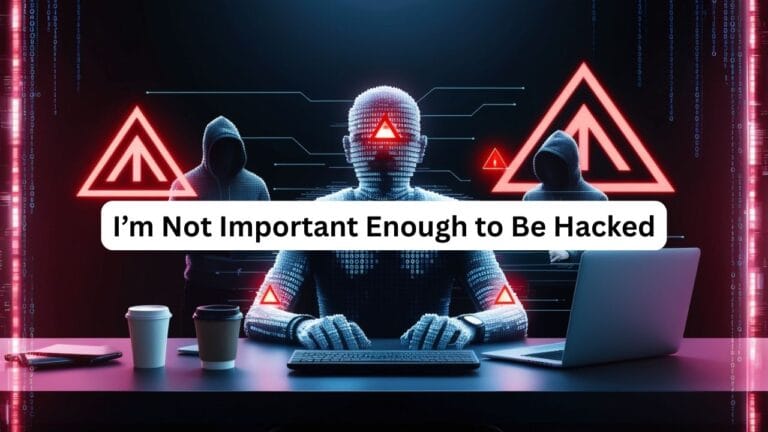Think you’re too small to be a hacker’s target? Think again. Cybercriminals don’t discriminate, they go after everyone, from individuals to multinational corporations. In fact, 60% of small businesses close within six months of a cyberattack (Verizon 2024 DBIR). Your personal data, bank details, and even social media accounts are valuable to hackers. Let’s break down why this mindset is dangerous and how to protect yourself.
No one is too insignificant to be targeted by cybercriminals. This pervasive myth has led many individuals to neglect essential cybersecurity practices, leaving them vulnerable to attacks. In today’s interconnected digital landscape, every user holds data that can be exploited, making cybersecurity awareness crucial for all.WIREDRobots.net
Cyber threats have evolved, targeting not just large corporations but also individuals, small businesses, and everyday internet users. Hackers employ automated tools to scan for vulnerabilities indiscriminately, meaning that anyone with an online presence is a potential target. Understanding this reality is the first step toward safeguarding your digital life.
You might assume hackers only want high-profile targets like celebrities or CEOs. But the truth? Automated bots don’t care who you are—they attack anything vulnerable. One client, Sarah, thought her freelance business was “too tiny” to be hacked—until her PayPal was drained overnight. By the end of this guide, you’ll see why cybersecurity isn’t just for the “important” people—it’s for you.
I Don’t Have Anything Valuable – Here’s What’s Really Happening
Your data is worth more than you think, even if you’re not a millionaire.
Hackers don’t just steal money; they exploit identities, resell login credentials, and hijack devices for larger scams. A 2024 Norton report found that 1 in 3 people reuse passwords, making them easy targets for credential-stuffing attacks.
Why Hackers Want “Ordinary” People
- Identity theft: Your name, birthdate, and SSN can be sold on the dark web for 1–50 (Privacy Affairs, 2025).
- Ransomware attacks: Hackers lock personal files (photos, documents) and demand payment.
- Botnet recruitment: Your infected device could be used in large-scale cyberattacks without you knowing.
Real-Life Example: Mark, a retired teacher, assumed hackers wouldn’t bother with him. Then his email was hacked, and scammers impersonated him to trick his friends into sending money.
The Hidden Factor Everyone Overlooks: Your Digital Footprint
You’re more exposed than you realize, even without “important” data.
A 2025 McAfee study revealed that 83% of people overshare personal info online, making social engineering attacks effortless for scammers.
Actionable Tip: The 2-Minute Privacy Check
- Google yourself – See what’s publicly available.
- Review social media settings – Limit old posts to “Friends Only.”
- Use Have I Been Pwned? – Check if your email was in a data breach.
Pro Tip: Think of your digital footprint like leaving your house keys under the doormat, hackers will look for them.
Strong Passwords Are Enough
Password protection is critical, but it’s not enough alone.
A 2024 Google Security Report found that 75% of breaches involved weak or reused passwords, but two-factor authentication (2FA) blocks 99% of automated attacks.
Why Just Passwords Fail
- Phishing scams trick you into entering passwords on fake sites.
- Keyloggers record keystrokes, stealing credentials even if they’re strong.
- Data breaches leak passwords, making them useless if reused.
Fix It:
- Use a password manager (Bitwarden, 1Password).
- Enable 2FA (SMS is okay, but authenticator apps are better).
- Never reuse passwords, especially for banking/email.
Step-by-Step Protection: Lock Down Your Accounts in 1 Hour
Follow this checklist to drastically reduce your risk, no tech expertise needed.
Phase 1: Immediate Fixes (15 mins)
Update software – Outdated apps are hacker gateways.
Enable 2FA – Start with email and banking.
Delete unused accounts – Reduce exposure.
Phase 2: Mid-Term Defense (30 mins)
Install an ad-blocker – Malicious ads can infect devices.
Back up files – Use cloud storage + an external hard drive.
Check router security – Change default passwords.
Phase 3: Long-Term Habits
Monitor credit reports – Freeze if needed.
Use a VPN on public Wi-Fi – Prevents snooping.
Educate family members – Scams often target older relatives.
Final Thoughts: You Are a Target, But You Can Fight Back
Cybercrime isn’t about importance, it’s about opportunity. Hackers cast wide nets, and if you’re unprepared, you will get caught. But with these steps, you’re no longer an easy target.
Believing that you’re not important enough to be hacked is a dangerous misconception. Cybercriminals target individuals indiscriminately, exploiting any available vulnerability. By understanding the value of your personal data and implementing robust security measures, you can significantly reduce your risk of falling victim to cyberattacks. Remember, in the digital age, everyone is a potential target, and proactive cybersecurity is essential for all.
Remember:
Small accounts get hacked more often because they’re less protected.
Your data has value, even if it’s “just” an email or social media login.
1 hour of prevention can save years of recovery.
Take action today, because in the digital world, everyone is important enough to hack.





